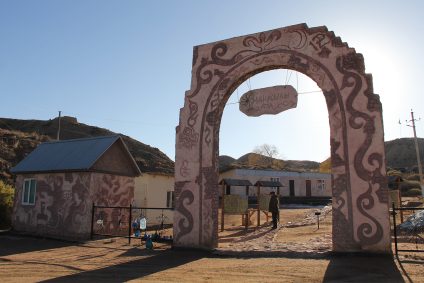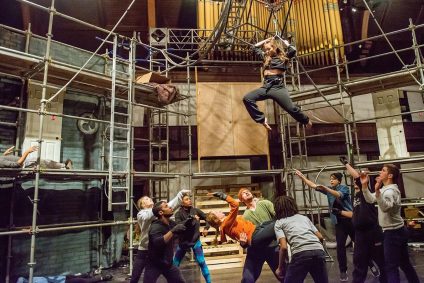Carving out space for rest is a sacred practice.
Most spiritual traditions encourage time to slow down and rest, whether through the practice of Sabbath, meditation, or pilgrimages. Yet, many of us struggle to find time in everyday life to even pause. Exhaustion can feel like the norm between work, juggling family obligations, and getting enough sleep.
Saundra Dalton-Smith, an internal medicine physician and author of “Sacred Rest,” embraced changes in her life after experiencing burnout and exhaustion. Turning to her faith practice, she explored the idea of rest from her Christian faith background. She identified seven dimensions of rest: physical rest, mental rest, sensory rest, creative rest, emotional rest, and spiritual rest.
Through her own experiences and research, she learned that living a well-rested life requires an active commitment to building restorative activities. As a workplace consultant and coach, she’s committed her life’s work to making rest accessible to anyone. I had the opportunity to interview Dalton-Smith to learn more about her book “Sacred Rest: Recover Your Life, Renew Your Energy, Restore Your Sanity,” the seven components of rest, and how to carve out time for rest in our busy lives.
This interview has been edited for length and clarity.
Anu Gorukanti: How did you identify the different components of rest?
Saundra Dalton-Smith: I have a background in biochemistry. So, when I look at problems, I look at them to see the most negligible unit I can work with. And, for myself, it was the smallest unit with rest, trying to figure out [what that was]. Initially, I thought I just needed more sleep. But I was still exhausted after getting 7, 8, 9, and 10 hours of sleep. So, I knew there was something else going on. Nothing was medically wrong with me. I was perfectly healthy. That opened the door to evaluate what else I needed to manage.
Because I am a person of faith, I started looking at the Bible. The concept of energy came to mind. I feel drained as if my batteries are empty. What will fill it back up if my battery is empty?
I started looking at what could be depleted and whether I was doing anything to replenish those areas and noticed [topics] that overlapped. For example, I noted things about digestion and different physical things and lumped all of those into “physical” [rest]. I had things that dealt with other relationships and lumped all those into “social” [rest]. I started combining science and research with spiritual stuff I found in the Bible to get a more holistic picture.
AG: How did your faith inspire you to write this book, and how did your relationship with it change while writing it?
SDS: I finally realized that the issue wasn’t sleep, but it was more rest. I know that the Bible talks a lot about rest. I see the creation story even concludes with rest.
I went [to the Bible] to get more details, and it came up so many times in many ways in the Old and the New Testaments. It really helped me to get a better understanding of why we struggle with it so much.
It helped me see the places I don’t trust within my faith. We rest at the level of our trust. If we are struggling with faith-based areas where we trust that things happen at the right time and that things can happen without us always having to be the manufacturer of them, it really starts putting things in perspective about why it’s hard for us to sometimes stop and rest.
AG: I’m curious what lessons from the book you’ve adopted into your life.
SDS: All of them. There’s probably not anything that I’m not actively doing or consistently working towards a greater understanding and implementation of my life. I’m critically aware of my own rest deficits. I do the rest quiz in my head so many times.
I continuously evaluate my own level of joy, peace, and satisfaction, how I am showing up, and whether I am slipping back into old habits.
I believe in sabbaticals and vacations. Most of us don’t do them effectively for restoration. You can take a vacation, have fun, and not leave feeling restored. So, I believe in them, but there does have to be a level of intentionality.
So I have vacations with my family, and we do fun stuff. Then, I have sabbaticals, where I will break away and do something related explicitly to burnout prevention. Reflection is a time to dream, envision, and regroup.
AG: Finding ways to constantly check in with yourself is significant in bringing intentionality to your time.
SDS: Most of the time, we should feel good in our mind, body, and spirit. You’re gonna catch colds every now and then, and you’re gonna stay up too late or overuse your body or your mind. But most of the time, we should feel good and well-rested.
I spent so many years thinking that feeling bad was the norm. Once you get a taste of the well-rested life, it’s hard to go back to that because you know there is something better.
That’s my barometer. I know how I feel and show up [when I’m well rested]. When I start feeling like the old me – the drained, exhausted, overperforming, inauthentic version of myself – I think of the weight of that, and it’s a choice.
It’s a choice we must make. Do we do the necessary things that may be uncomfortable, time-consuming, and require some transparency and vulnerability? Do we do those things and return to who we want to be?
AG: I’m curious about how you respond to people who say they don’t have time to rest because I’m sure that’s a typical response.
SDS: Yes, I hear that a lot. And usually, if you say you don’t have time to rest, you desperately need rest. What I try to help people understand is when you say you don’t have time, you think rest requires some preset amount of time. You’re limiting it before you enter it. You can do restorative activities within a moment.
If you’re in a noisy room and feel overwhelmed, a moment of sensory rest could be closing your eyes. A moment of social rest could be as simple as recording a love note to your husband. Emotional rest could be recording a voice memo that says you’re alive, beautiful, and kind and don’t have to adhere to anybody else’s expectations.
Anything we do that pours back into us; you do have time for that.

Anu Gorukanti
Anu Gorukanti, MD, is a public health practitioner and pediatric hospitalist. She is also the co-founder of Introspective Spaces, a social venture committed to building reflective space and community for women in healthcare. She was a member of the Sacred Journeys and Witness fellowships. She cares deeply about the well-being of her colleagues in healthcare and is passionate about healthcare reform to create equitable and compassionate care for patients and communities. In her free time, she loves to photograph landscapes, learn to dance, and spend time with her wonderful husband, friends, and family.
Latest Articles
-

American Civic Life
Once Protected by its Remoteness, a Sacred Lake in Kyrgyzstan is Threatened by Change
April 26, 2024
-

-

-

-

Interfaith America Interview
"You Desperately Need Rest," Author Dalton-Smith on Sacred Rest
April 16, 2024
Join us today
Get inspired, equipped, and connected to unlock the potential of America’s religious diversity.